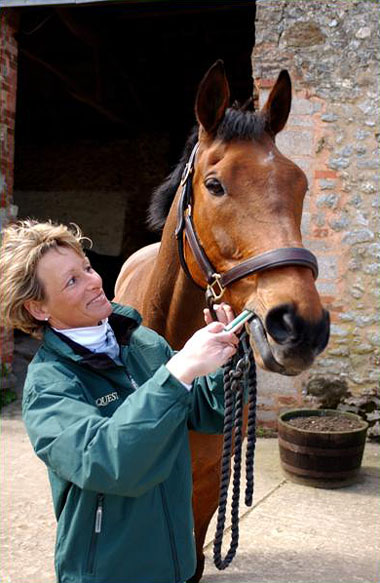Remember To Keep Your Grazing Clean This Summer
 13 years ago
13 years ago  2299 views
2299 views
Posted
21st June, 2011 16h40
 Mary King
To keep your pasture as worm-free as possible it’s important to poo-pick regularly, preferably every day during the summer, to try and minimise contamination with worm larvae. You should also keep a careful eye on the worm burden of your horses, by carrying out a summer faecal worm egg count (FWEC). This will help you to detect which horses are shedding the most worm eggs and larvae onto your pasture.
Yard circumstances vary, but equally importantly, all horses are different and as such it’s important to treat horses as individuals within your herd. Worming your horses in accordance with the results of the FWEC will reduce further contamination of the pasture by horses with high egg counts - helping to keep all your horses free of significant worm burdens and any worm related disease.
Three day event rider Mary King always has an FWEC done for her brood mares and youngstock over the summer. She says: “The brood mares and youngsters spend the entire summer at grass and I believe it’s crucial to keep a check on their worm situation – especially the youngsters who won’t have built up any immunity to some of the worms. We poo pick the fields three times a week and take an FWEC and worm accordingly in early, mid and late summer depending on results.”
Ben Gaskell, Pfizer’s veterinary advisor continues: “Don’t be surprised to have a diversity of FWEC results from horses that are sharing a field. Each one should be treated according to need, rather than by adopting a ‘one size fits all approach’. This will help keep all your horses in the best of health and also have long term benefits in helping to slow resistance to the wormers available to us.”
Take control of worm control by picking up your free EQUEST worming guide from your SQP retailer or vet. For further information, speak to your vet, SQP or visit www.wormingyourhorse.info.
Mary King
To keep your pasture as worm-free as possible it’s important to poo-pick regularly, preferably every day during the summer, to try and minimise contamination with worm larvae. You should also keep a careful eye on the worm burden of your horses, by carrying out a summer faecal worm egg count (FWEC). This will help you to detect which horses are shedding the most worm eggs and larvae onto your pasture.
Yard circumstances vary, but equally importantly, all horses are different and as such it’s important to treat horses as individuals within your herd. Worming your horses in accordance with the results of the FWEC will reduce further contamination of the pasture by horses with high egg counts - helping to keep all your horses free of significant worm burdens and any worm related disease.
Three day event rider Mary King always has an FWEC done for her brood mares and youngstock over the summer. She says: “The brood mares and youngsters spend the entire summer at grass and I believe it’s crucial to keep a check on their worm situation – especially the youngsters who won’t have built up any immunity to some of the worms. We poo pick the fields three times a week and take an FWEC and worm accordingly in early, mid and late summer depending on results.”
Ben Gaskell, Pfizer’s veterinary advisor continues: “Don’t be surprised to have a diversity of FWEC results from horses that are sharing a field. Each one should be treated according to need, rather than by adopting a ‘one size fits all approach’. This will help keep all your horses in the best of health and also have long term benefits in helping to slow resistance to the wormers available to us.”
Take control of worm control by picking up your free EQUEST worming guide from your SQP retailer or vet. For further information, speak to your vet, SQP or visit www.wormingyourhorse.info.More from
- IVC Evidensia assembles expert team to run new £10m referral hospital
- Home delivery service can increase pet health plan sign-ups by 25%
- Research reveals vital clues to help fight anthelmintic resistance
- Lifetime Achievement Award recognises Harrogate vet’s dedication to improving the health and welfare of rabbits
- Bake sale at Leicestershire vet practice for good cause


 20 hours ago
20 hours ago